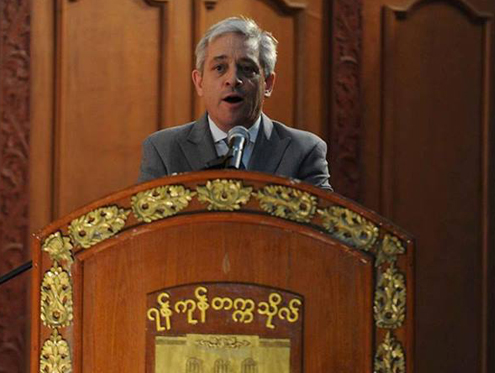The Speaker of the British House of Commons, John Bercow, warned during a speech at Rangoon University today that unchecked religious violence threatens to undermine Burma’s nascent reform process.
Becrow’s speech came the same day as President Thein Sein took to the country’s airwaves to condemn ‘veiled’ hate speech.
The remarks from both Thein Sein and John Bercow come amidst an increasingly anti-Muslim atmosphere in Burma. Over the past 15 months Burma has been marked by repeated outbreaks of bloody communal violence that has spread from the country’s southwestern coast to the Shan plateau in the northeast.
“In this multi-ethnic and mulch-religious nation – home to Buddhists, Christians, Muslims, Hindus and Animists – respect for religious diversity and freedom is essential,” said the speaker.
“If such violence and hatred continue, they threaten to undermine all that has been achieved in the past two years, and to snatch from you the freedom and democracy for which you have struggled so long just when they appear at last to be in sight.”
[related]
Mr. Bercow went on to urge government officials to prevent further unrest and bring the perpetrators “of such hatred and violence to justice”. The speaker then called on Burma’s government to review the controversial 1982 citizenship law that stripped the Muslim Rohingyas of their citizenship.
During Thein Sein’s monthly radio address ,which also took place today, the president alluded to a speech by the country’s late independence hero General Aung San as he denounced religiously motivated violence.
“Our society must never tolerate thoughtless, ruthless and abusive violent acts in the name of religion,” said Thein Sein.
“[Aung San] also cautioned us that we must always condemn and prevent hate speech veiled with religious overtones.”
However, analysts claim that the president has an ambiguous record when it comes to denouncing religious violence, while at the same time ignoring some of the most notorious perpetrators of sectarian unrest in the country.
“Some of the rhetoric coming from the president has of course been positive and welcome, although not always. Some of his remarks about the Rohingya last year were very disturbing, so his rhetoric has been mixed,” said Christian Solidarity Worldwide’s East Asia team leader Benedict Rogers in reference to the fact that only last year Thein Sein proposed resettle en mass of Burma’s stateless Muslim minority to a third country, something that he later dropped after international criticism.
“In his rhetoric in recent months, he’s sort of said the right things about religious freedom and religious harmony, but I haven’t seen any evidence that its really been followed through with action” said Rogers, a long-time Burma watcher and author of biography on retired General Than Shwe.
In late June, Thein Sein’s government banned the July issue of Time magazine, which featured Burma’s notorious nationalist monk Wirathu on the front cover along with the headline: “The Face of Buddhist Terror”.
The president went on to defend Wirathu, whose known for leading the Buddhist nationalist 969 movement by traveling across the country to deliver thinly veiled anti-Muslim sermons, as both a noble person and “son of Buddha”.
During Thein Sein’s trip to the UK and France last month, representatives from both governments pressed the former general on his efforts to quell religious violence and provide the Rohingya, whom UN reports describes as some of the most persecuted people in the world, with basic rights.
During a TV appearance in Paris, Thein Sein scoffed at allegations leveled by Human Rights Watch that Burma’s government was complicit in the anti Rohingya riots that took place last year in Arakan state, a series of violent incidents which the New York-based group described as ethnic cleansing.
“Outside elements are just exaggerating, fabricating news, there is no ethnic cleansing whatsoever,” Thein Sein told his interviewer.
“This is a smear campaign against the government. What happened in Rakhine (Arakan state) was not ethnic cleansing.”
But after dropping a majority of the sanctions that once targeted the former pariah state, Rogers says western governments have lost a great deal of their potential political leverage over Burma’s leaders.
“I think my question regarding the British government’s approach is that they have moved very far down the road from being able to use actual forms of pressure,” said Rogers, adding that the country’s new openness does allow for public forums to address subjects the government shies away from or deems taboo.
“I think as the democratic space opens up more in Burma and it becomes more normal to exercise freedom of expression, I think it’s important that visiting foreign dignitaries exercise their freedom of expression and raise issues that need to be aired in public and engage in a greater debate with the people of Burma about the challenges that they face”.



